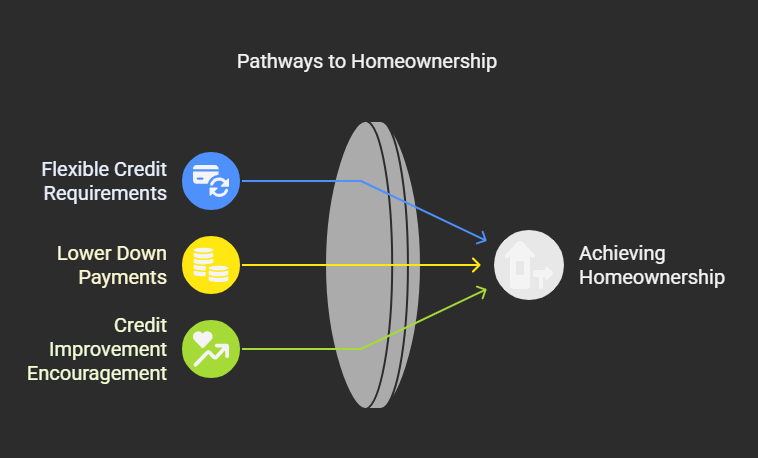As a first-time homebuyer, you’ve got several mortgage options tailored to your needs. Conventional loans are flexible but may require PMI if your down payment is under 20%. FHA loans, with lower down payment requirements, suit those with modest credit scores. VA loans, available for veterans, often require no down payment or mortgage insurance. USDA loans cater to rural buyers and also typically require no down payment. Fixed-rate mortgages provide stable payments, while adjustable-rate mortgages offer lower initial rates with potential fluctuations. Additionally, first-time homebuyer programs can offer assistance. Exploring these options can help you make informed decisions.
Conventional Loans
When you’re stepping into the world of homeownership, understanding conventional loans is essential. These loans aren’t backed by the government, which sets them apart from options like FHA loans.
One of the key conventional loan benefits is the potential for lower interest rates, especially if you have a good credit score. This makes your monthly payments more manageable over time.
Additionally, conventional loans offer various mortgage insurance options. If you put down less than 20%, lenders typically require private mortgage insurance (PMI). This insurance protects the lender in case of default, but it can be removed once you build sufficient equity in your home, which isn’t always the case with government-backed loans.
Moreover, conventional loans can be used for a wide range of property types and are available in fixed or adjustable-rate formats. This flexibility allows you to choose a mortgage that fits your financial situation and long-term goals.
FHA Loans
If you’re a first-time buyer, FHA loans could be a great option for you.
They often feature low down payment requirements and more flexible credit standards, making homeownership more accessible.
Understanding these benefits can help you determine if an FHA loan fits your financial situation.
Low Down Payment
For many first-time homebuyers, FHA loans offer a valuable pathway to homeownership with their low down payment requirements. These loans allow you to purchase a home with as little as 3.5% down, making them an attractive option if you’re concerned about saving for a larger deposit.
You might’ve heard various low down payment myths, such as the belief that you need a perfect credit score or a hefty savings account. In reality, FHA loans are designed to help people like you, who may not have traditional financial resources.
Utilizing low down payment strategies can greatly ease the burden of homebuying. By leveraging FHA loans, you can maintain more liquidity for other expenses, such as moving costs, home repairs, or even emergency funds.
Additionally, the upfront mortgage insurance premium can be rolled into the loan, further reducing your immediate cash needs.
Understanding these options empowers you to make informed decisions as you navigate the homebuying process. Remember that while FHA loans offer a great starting point, exploring other programs can also help you find the best fit for your financial situation.
Flexible Credit Requirements
FHA loans stand out for their flexible credit requirements, making them accessible to a wider range of buyers. Unlike conventional loans, which often require higher credit scores, FHA loans allow you to qualify with scores as low as 580, and even lower under certain conditions. This opens doors for first-time buyers who may have limited credit histories or challenges in their financial backgrounds.
By utilizing FHA loans, you can take advantage of alternative lending options that cater to your unique situation. If your credit score is below the typical threshold, you can still pursue homeownership while working on credit improvement strategies. Lenders often encourage you to improve your credit score over time, which can lead to better loan terms in the future.
Additionally, FHA loans require a lower down payment, further easing the financial burden. This combination of flexible credit requirements and lower initial costs makes it a popular choice for many first-time buyers.
As you navigate your home-buying journey, consider how FHA loans can provide a pathway to realizing your dream of homeownership, even if your credit isn’t perfect right now.

VA Loans
If you’re a veteran or active-duty service member, VA loans might be a great option for you as a first-time buyer.
These loans come with specific eligibility requirements that can make homeownership more accessible, and they offer unique benefits that set them apart from conventional loans.
Understanding these factors can help you determine if a VA loan is the right fit for your financial situation.
Eligibility Requirements Explained
VA loans offer distinct eligibility requirements that set them apart from other mortgage options. To qualify, you must be an eligible veteran or active-duty service member, and you’ll need to obtain a Certificate of Eligibility (COE).
While there’s no minimum credit score set by the VA, most lenders prefer a score of 620 or higher. Income verification is vital, as lenders will review your financial stability and employment history to ascertain you can manage monthly payments.
Your debt to income ratio should ideally be below 41%, but some lenders may allow higher ratios. VA loans have specific loan limits, which vary by location, so it’s important to check local limits when planning your purchase.
Unlike many other loan types, VA loans typically don’t require mortgage insurance, which can save you money. You can also receive down payment assistance, making homeownership more accessible.
The property type must meet certain standards, and you’ll need to take into account the loan term and closing costs involved. Understanding these eligibility requirements can help you navigate the VA loan process effectively.
Benefits of VA Loans
One of the standout advantages of VA loans is that they often require no down payment, making homeownership attainable for many first-time buyers. This feature can greatly ease the financial burden, allowing you to invest in a home without needing to save for a traditional down payment.
Additionally, VA loans typically come with competitive interest rates, which can lead to lower monthly payments over time.
Another key benefit is that VA loans don’t require private mortgage insurance (PMI), which is often a requirement for conventional loans with less than 20% down. This can save you money each month, further enhancing your affordability.
To qualify for VA loans, you must meet specific VA loan eligibility criteria, including service requirements. Generally, veterans, active-duty service members, and certain members of the National Guard and Reserves can apply.
You’ll also find that VA loans have more flexible credit score requirements compared to conventional loans, making it easier for you to secure financing.
With these notable VA loan benefits, it’s no wonder that many first-time buyers consider this option an excellent pathway to homeownership.
USDA Loans
For many first-time buyers, USDA loans can be an attractive option, especially for those looking to purchase a home in rural areas. These loans are designed to promote homeownership in less populated regions, providing several usda loan benefits that can make your buying experience smoother.
One of the most significant advantages is that they typically require no down payment, which can be a major hurdle for many buyers. Additionally, USDA loans often come with lower interest rates compared to conventional loans, which can save you money over the long term.
However, it’s important to be aware of the usda income limits, which determine your eligibility based on your household income. Generally, your income must be within 115% of the median income for your area to qualify for a USDA loan.
Moreover, USDA loans also have flexible credit requirements, making them accessible to a broader range of buyers. If you’re considering a home in a designated rural area, exploring USDA loans could be a practical step toward achieving your homeownership goals without the burden of a hefty down payment or high interest rates.
Fixed-Rate Mortgages
How can a fixed-rate mortgage provide stability for first-time buyers? With a fixed-rate mortgage, you lock in your interest rate for the entire loan term, which typically ranges from 15 to 30 years. This means your monthly payments remain consistent, allowing you to budget effectively without worrying about fluctuations in interest rates.
For first-time buyers, stability is vital during the homeownership journey. You won’t be affected by rising rates that can occur in the market, which can lead to increased monthly payments if you were to choose a different mortgage type.
Fixed-rate mortgages also offer predictability, as you’ll know exactly how much you need to pay each month, making financial planning much simpler.
Additionally, having a fixed rate can help you build equity in your home at a steady pace. While the initial rates may vary, securing a lower rate when borrowing can lead to significant savings over the life of the loan.
Adjustable-Rate Mortgages
While fixed-rate mortgages offer stability, adjustable-rate mortgages (ARMs) present a different set of advantages for first-time buyers. One of the main attractions of ARMs is their initial lower interest rates, which can lead to considerably lower monthly payments compared to fixed-rate options. This can make homeownership more accessible, especially if you’re working with a tighter budget.
However, it’s important to understand that ARMs come with rate adjustments that can change your payment amounts over time. Typically, ARMs start with a fixed rate for a set period, after which the interest rate adjusts periodically based on market conditions. This means you could experience payment fluctuations, which can increase your monthly expenses down the road. It’s essential to evaluate how these potential increases may impact your financial situation.
If you plan to stay in your home only a few years, an ARM might be a suitable choice, allowing you to benefit from those lower initial rates. However, if you’re seeking long-term stability, the unpredictability of ARMs mightn’t align with your financial goals.
Always weigh your options carefully and consult with a mortgage professional to determine what’s best for you.
First-Time Homebuyer Programs
Numerous first-time homebuyer programs exist to help you navigate the complexities of purchasing your first home. These programs can provide invaluable resources, making the process smoother and more accessible. Many states offer state-specific programs tailored to meet the unique needs of residents.
These initiatives often include education courses that guide you through the homebuying journey, helping you understand your options and responsibilities as a homeowner.
One significant advantage of these programs is down payment assistance. Many first-time buyers struggle with the upfront costs, but various programs can help offset these expenses. This assistance may come in the form of grants or low-interest loans, enabling you to secure a home without exhausting your savings.
Additionally, some programs provide favorable mortgage terms, such as lower interest rates or reduced mortgage insurance, making homeownership more attainable.
Researching your state’s offerings is essential, as eligibility and benefits can vary widely. By exploring these first-time homebuyer programs, you can find the support and resources needed to make informed decisions and successfully purchase your first home.
Don’t hesitate to reach out to local housing agencies or lenders to learn more about your options.
Conclusion
In summary, exploring various mortgage options is essential for first-time buyers like you. From conventional and FHA loans to VA and USDA loans, each choice has unique benefits that cater to different financial situations. Additionally, fixed-rate and adjustable-rate mortgages offer flexibility in managing payments. Don’t forget to take into account state-specific first-time homebuyer programs, which can provide valuable assistance. By understanding these options, you can make an informed decision and take a significant step toward homeownership.
Finance News 365 is an online platform dedicated to providing individuals and businesses with comprehensive financial insights, market trends, and resources to make informed decisions.







